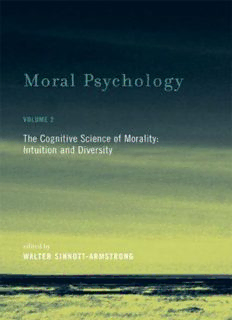
Moral Psychology, Volume 2: The Cognitive Science of Morality: Intuition and Diversity PDF
Preview Moral Psychology, Volume 2: The Cognitive Science of Morality: Intuition and Diversity
Moral Psychology Moral Psychology Volume 2: The Cognitive Science of Morality: Intuition and Diversity edited by Walter Sinnott-Armstrong A Bradford Book The MIT Press Cambridge, Massachusetts London, England © 2008 Massachusetts Institute of Technology All rights reserved. No part of this book may be reproduced in any form by any elec- tronic or mechanical means (including photocopying, recording, or information storage and retrieval) without permission in writing from the publisher. MIT Press books may be purchased at special quantity discounts for business or sales promotional use. For information, please e-mail [email protected] or write to Special Sales Department, The MIT Press, 55 Hayward Street, Cambridge, MA 02142. This book was set in Stone Sans and Stone Serif by SNP Best-set Typesetter Ltd., Hong Kong and was printed and bound in the United States of America. Library of Congress Cataloging-in-Publication Data Moral psychology / edited by Walter Sinnott-Armstrong. v. cm. “A Bradford Book.” Includes bibliographical references and index. Contents: v. 1. The evolution of morality : adaptations and innateness—v. 2. The cognitive science of morality : intuition and diversity—v. 3. The neuroscience of morality : emotion, disease, and development. ISBN 978-0-262-19561-4 (vol. 1 : hardcover : alk. paper)—ISBN 978-0-262-69354-7 (vol. 1 : pbk. : alk. paper)—ISBN 978-0-262-19569-0 (vol. 2 : hardcover : alk. paper)— ISBN 978-0-262-69357-8 (vol. 2 : pbk. : alk. paper)—ISBN 978-0-262-19564-5 (vol. 3 : hardcover : alk. paper)—ISBN 978-0-262-69355-4 (vol. 3 : pbk. : alk. paper) 1. Ethics. 2. Psychology and philosophy. 3. Neurosciences. I. Sinnott-Armstrong, Walter, 1955– BJ45.M66 2007 170—dc22 2006035509 10 9 8 7 6 5 4 3 2 1 This volume is dedicated to all of my students who challenged and inspired me, especially Jana Schaich Borg, Jon Ellis, and Laura Donohue. Contents Acknowledgments xi Introduction xiii Walter Sinnott-Armstrong 1 Moral Intuition = Fast and Frugal Heuristics? 1 Gerd Gigerenzer 1.1 Fast, Frugal, and (Sometimes) Wrong 27 Cass R. Sunstein 1.2 Moral Heuristics and Consequentialism 31 Julia Driver and Don Loeb 1.3 Reply to Comments 41 Gerd Gigerenzer 2 Framing Moral Intuitions 47 Walter Sinnott-Armstrong 2.1 Moral Intuitions Framed 77 William Tolhurst 2.2 Defending Ethical Intuitionism 83 Russ Shafer-Landau 2.3 How to Apply Generalities: Reply to Tolhurst and Shafer-Landau 97 Walter Sinnott-Armstrong 3 Reviving Rawls’s Linguistic Analogy: Operative Principles and the Causal Structure of Moral Actions 107 Marc D. Hauser, Liane Young, and Fiery Cushman viii Contents 3.1 Reviving Rawls’s Linguistic Analogy Inside and Out 145 Ron Mallon 3.2 Resisting the Linguistic Analogy: A Commentary on Hauser, Young, and Cushman 157 Jesse J. Prinz 3.3 On Misreading the Linguistic Analogy: Response to Jesse Prinz and Ron Mallon 171 Marc D. Hauser, Liane Young, and Fiery Cushman 4 Social Intuitionists Answer Six Questions about Moral Psychology 181 Jonathan Haidt and Fredrik Bjorklund 4.1 Does Social Intuitionism Flatter Morality or Challenge It? 219 Daniel Jacobson 4.2 The Social Intuitionist Model: Some Counter-Intuitions 233 Darcia Narvaez 4.3 Social Intuitionists Reason, in Conversation 241 Jonathan Haidt and Frederick Bjorklund 5 Sentimentalism Naturalized 255 Shaun Nichols 5.1 Normative Theory or Theory of Mind? A Response to Nichols 275 James Blair 5.2 Sentimental Rules and Moral Disagreement: Comment on Nichols 279 Justin D’Arms 5.3 Sentiment, Intention, and Disagreement: Replies to Blair and D’Arms 291 Shaun Nichols 6 How to Argue about Disagreement: Evaluative Diversity and Moral Realism 303 John M. Doris and Alexandra Plakias 6.1 Against Convergent Moral Realism: The Respective Roles of Philosophical Argument and Empirical Evidence 333 Brian Leiter Contents ix 6.2 Disagreement about Disagreement 339 Paul Bloomfield 6.3 How to Find a Disagreement: Philosophical Diversity and Moral Realism 345 Alexandra Plakias and John M. Doris 7 Moral Incoherentism: How to Pull a Metaphysical Rabbit out of a Semantic Hat 355 Don Loeb 7.1 Metaethical Variability, Incoherence, and Error 387 Michael B. Gill 7.2 Moral Semantics and Empirical Inquiry 403 Geoffrey Sayre-McCord 7.3 Reply to Gill and Sayre-McCord 413 Don Loeb 8 Attributions of Causation and Moral Responsibility 423 Julia Driver 8.1 Causal Judgment and Moral Judgment: Two Experiments 441 Joshua Knobe and Ben Fraser 8.2 Can You Be Morally Responsible for Someone’s Death If Nothing You Did Caused It? 449 John Deigh 8.3 Kinds of Norms and Legal Causation: Reply to Knobe and Fraser and Deigh 459 Julia Driver References 463 Contributors 499 Index to Volume 1 501 Index to Volume 2 529 Index to Volume 3 559
Description: